Rick Wayne's Blog, page 20
June 4, 2020
(Fiction) The da Vinci Project
[image error]
—nothing if not ambitious. Like its namesake, it sought to answer some of the biggest and most persistent questions in science—particularly, how much of who we are is determined by our genes and how much by our environment? It was conceived by the curators of the Museo Ideale Leonardo da Vinci in Vinci, Italy, at a party, hosted by the Italian government, celebrating genetic confirmation of the authenticity of Leonardo’s remains, which had long been a mystery. After several glasses of wine, or so the curators claim, they began to speculate—and then, in typical Italian fashion, to argue—about society’s intractable problems, beginning with the perils of the geometric expansion of technology and ending with the global market economy’s reliance on endless economic growth, particularly given that every demographic model since the 1990s had projected global population growth would keep slowing and that the human population would actually level off around 10 billion sometime in the early 22nd century. While perhaps good news for the planet, it meant the dangerous game of musical chairs that had sustained post-war wealth would finally stop. As consumption approached a maximum in a more or less fixed population, a market economy would become a zero-sum game, where the only way those at the top could satiate their human greed would be to take ever more from those at the bottom, until ultimately everything collapsed.
They concluded, as many have since, that society’s reliance on endless economic growth meant that society, at least as we had known it since the Great Depression, was not viable long term, and that this was true regardless of any other existential threat, such as climate change or the rise of AI. According to Guglielmo Tocci, the museum’s scientific director, everyone agreed on this. Where the scientists differed was what, if anything, could be done about it. At some point, Tocci joked that since they then had Leonardo’s genetic material in the lab, they should clone him and ask.
Although the argument was forgotten, the idea stuck, and what started as a jest eventually morphed into an unprecedented and controversial project involving nine governments, seven universities, and an alphabet soup of private companies and NGOs. Widely abbreviated dVP, The da Vinci Project asked whether it was even possible to develop social systems that escaped a reliance on greed and endless consumption. In other words, could nurture—which is to say mechanisms of acculturation, sometimes called memetics—override nature, our biology, including our genetic code? The plan was as simple as it was controversial: create a baseline of maximum human potential by resurrecting the great minds of the past through cloning; rear them in a stable, emotionally healthy environment; measure every aspect of their mental, social, and material well-being.
“It’s no different,” Dr. Tocci said on Italian state television, “than twin studies. Studying twins separated at birth has long been common in the social sciences. Our children share a genome with their alters. Nothing more. But by using genomes we know, through history, represent the pinnacle of human possibility, we create an upper bound on what kinds of societies are possible. That is why—
—and later to convince the Pope that no bodies were exhumed as part of the project. In two cases, genetic material was recovered from the donor’s grave by probe. In all of the others, it had been preserved by other means. In 2019, for example, the television show Antiques Roadshow revealed that a ring found in a Welsh attic contained braided locks of Charlotte Brontë’s hair. Authenticity was later confirmed by multiple lines of evidence, both historical and scientific, including genetic comparison to several of the author’s heirs.
In the end, eleven viable embryos were produced with a 12th added later—a gift from the Russian government, which had originally declined to participate when the dVP scientists refused to guarantee that any donor would remain male. Rather than be left out, the Russians stunned the world by providing a female genome, which was required to balance the total. The donors were, in order of birth: an athlete, Muhammad Ali; a revolutionary, Ernesto Guevara; a novelist, Charlotte Brontë; a poet, Edgar Allan Poe; a spiritual leader, Tenzin Gyatso, the 14th Dalai Lama; an entrepreneur, Steve Jobs; a scientist, Albert Einstein; a model and cultural icon, Marilyn Monroe; an inventor, Nikola Tesla; a composer, Ludwig van Beethoven; an artist and designer, Leonardo da Vinci; and later, a political leader, Yekaterina Alekseyevna, better known as Catherine the Great.
Several Muslim and Christian organizations were approached initially and asked to participate. All declined on grounds of faith, including the family of Martin Luther King, Jr., who wrote a lengthy and scathing—
—condemned by most Western governments, even as several of their universities participated, there being no laws at the time that expressly forbade it. The United Nations issued a formal approbation, as did the EU. Facing the threat of immediate shutdown, the embryos were taken from their home in the hills of Tuscany and flown to a laboratory just outside Taipei, Taiwan. It was the perfect climate. Being more communitarian than individualistic, the peoples and governments of East Asia were fascinated by the study, particularly what it might reveal about the origins of anti-social behavior, with which they had long wrestled.
The academic community discussed—at length—the range of ethical and legal issues raised, but the public fixated instead on charges of racism, imperialism, and sexism. Before any embryos were even produced, the internet had decided dVP was irredeemably flawed and there was nothing of genuine value it could possibly teach the world.
In response, dVP scientists produced an advertising campaign, funded by anonymous donors, that pointed out in colorful charts and graphs that, first, they could not simply pick whoever they wanted. Their goal was to answer a scientific question. It was their hope that the results of the test would eventually inform models of distributive justice. Even so, the ethnic composition of the project was limited by availability. All donor material had to be ethically sourced, to start. Although one of the genomes came from an earlier sequencing study funded by the British government, the rest had to be acquired individually, which was costly and time-consuming. Written permission from legal descendants was required, where they were known, and even though the project itself didn’t require government approval at the time it began—it was later banned by the EU—licenses and registrations had to be secured from multiple jurisdictions at multiple points in the process, even for such seemingly simple tasks as transporting the samples across a border. Gandhi’s family, for example, refused the request, and although the Mandela family agreed, the South African government would not permit transport of his genome out the country, classifying it as a “significant cultural artifact,” a legal decision that would later cause multiple deaths when the country’s blood-donor system was halted by injunction. Since blood contains DNA, the court had to rule on how it could be imported.
Second, the scientists pointed out that since DNA degrades, donors more than several centuries old had to be avoided as there would be significant chance that any recovered material would be incomplete, voiding the time and expense of acquiring it. Antique donors also raised questions of authenticity. No one knows where the Buddha is buried, or Genghis Khan. The researchers wanted to be certain that any genome acquired definitively belonged to the person in question, versus simply being “historically likely.” The aims of the test also required donors to have made “a lasting impact on human culture,” which meant some historical objectivity was required. To rule out the merely popular, the recently deceased were also excluded.
The end result was that the window of availability largely fell inside the so-called “imperial period” of world history, and donors were disproportionately (but not exclusively) European males. However, though the researchers could do little about race, gender was equilibrated. Because genetic males have both sex chromosomes, X and Y, male donors can produce female clones, but not the other way around. The dVP geneticists switched the genders of three random male donors—Nikola Tesla, Muhammad Ali, and Steve Jobs—by deleting their Y chromosome and replacing it with a second copy of their X. Although this meant they were not perfectly identical, it did expand the reach of the test to include possible gender effects. For example, would their talents convey?
To insure viability, multiple embryos were produced and frozen. Each was identified by its donor’s surname and a randomly assigned first na—
—until the dVP kids turned 13, when, inspired by reading their story in school two years earlier, 16-year-old Seung-Hi Choi claimed to have given birth to a clone of CTX, the stage name of Cheol Bo, 24-year-old member of the K-pop boy band Big Crush, with whom Ms. Choi was obsessed. The young woman purportedly acquired Mr. Bo’s DNA in a used tissue he discarded in a waste bin after a public appearance. A huge debate followed, during which many members of the public realized for the first time that there was no way to prevent the continual leak of their DNA,a ndindeed that anyone could be cloned surreptitiously. The singer’s fans were incensed—jealous, according to Ms. Choi’s supporters—but because he had clearly discarded the tissue in the trash, the acquisition of his DNA could not be defined as theft under any existing Korean law. Nor did the young woman break any laws by modifying the home DNA-testing equipment she used, probably at her high school’s biology lab, to isolate the material and later impregnate herself.
In a startling twist to the story that, for several weeks, captivated half the world, detectives hired by CTX’s recording company turned the tables on the young Ms. Choi by acquiring a used diaper from her trash, from which it was shown that it was all a hoax. The baby was not a clone, nor was it even related to Mr. Bo.
But the warning shot had been fired, and fiction became fact five years later when a couple in Lagos, Nigeria successfully gave birth to the genetic clone of a local land magnate, from whom they were able to exact child support payments, by law, commensurate with his income rather than theirs, which encouraged the very wealthy to isolate themselves even—
rough cut from my novel-in-progress
June 3, 2020
(Art) The Old World Fantasy of Carlos Palma Cruchaga
[image error]
The paintings of Carlos Palma Cruchaga bridge the fantasy of the old world — black sabbaths, angels, ghosts, winged horses — with the new, post-Tolkien worlds of elves, dragons, and high adventure.
Find more by the artist on his ArtStation page.



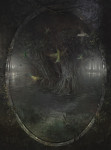



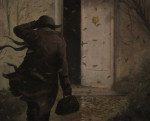

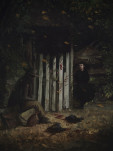

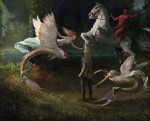
June 2, 2020
May 29, 2020
(Fiction) Signs
[image error]
An alarm blared in short, piercing tones.
Nio sat stirring the lukewarm coffee and peering out the windows of the dim office for the stout Agent Quinn, who was no doubt rushing to her location. Next to the door was a decade-old public service poster urging everyone to get their annual vaccine. It dated from the early days of the contagion and was full of implicit threats. Unlike the comparable posters from a century before, which urged discretion—Loose Lips Sink Ships!—this announcement suggested it was better to report on the neighbors:
SILENCE SPREADS DISEASE!
REPORT ALL CASES TO YOUR
MINNESOTA CMC OFFICE
Despite the panic, the zombie apocalypse had never come. Out of a global population of just over nine billion, it was estimated that no more than fifty thousand had died from the “zombie” virus, or 0.0005%. And yet, the catastrophe was genuine. Five times as many people died from senseless panic: riots, looting, and mob lynchings of those suspected of being infected—or even of hiding those that were. In a handful of now-famous court cases in Spain and the US, individuals filmed leading mobs that broke forcefully into homes were either acquitted or left with light sentences, particularly if they were women, on grounds that they were acting “in self defense.”
The door at the back of the office opened and an Indian man appeared.
“What the hell?” he yelled at Nio, who sat drinking bad coffee. “I thought the building was on fire! Are you fucking crazy lady?”
“Debatable,” she said, taking another sip.
“You think that’s funny?” He strode around the counter like he intended to berate her.
Quinn burst through the front door. He looked half asleep. He wore nothing but a T-shirt and boxers. Both his legs were missing below the knee. In place of bare feet were a pair of studded rubber soles, each attached to a 3D titanium lattice in the rounded shape of a human leg. His phone was in his hand. It was also emitting an alarm, similar to that from the bracelet but out of phase with it, and the two together were quadruply annoying. He turned them off with a few quick taps.
“Thank you, sir,” Quinn said to the manager. “I’ll take it from here. I apologize for the inconvenience.”
The man looked back and forth between them. He was furious, but Quinn’s size was putting a damper on his anger. “Are you going to let her get away with this?”
Quinn stood straight in front of him. “I apologize,” he repeated softly. “Everything’s under control. Thank you.”
The man looked flummoxed. In a moment, he disappeared again through the back door.
“Must be nice being tall,” Nio said.
Agent Quinn collapsed into a chair and rubbed his face. He yawned. “Jesus,” he said in the middle of it. “What the hell are you doing?”
“I couldn’t sleep.”
“And so you wanted to make sure no one else could?”
“I wanted to see the case files.”
“So knock.”
“I did. Three times.”
“So you woke up the entire motel?”
She shrugged as if to say “well, it worked.” She glanced involuntarily at his legs before standing up and walking to the door.
Quinn followed her out the door. “Go ahead,” he said as they climbed the stairs.
“Go ahead what?”
“Ask.”
“It’s your business,” she said. “So can I get it or not?”
Quinn took out his key card and unlocked his room. The box was on the table. A fancy folding suitcase hung from the bathroom door. Nio didn’t have a key, so she had propped open her door with the security latch. Quinn handed her the box and she walked in her socks back to her room.
“Thanks,” she said.
He only shook his head and slammed the door.
Nio sat cross-legged on the bed and opened the remnants of a life, the last pieces of a man who had for all intents and purposes been a brother. The FBI had been diligent if uninspired in their investigation, or so it seemed from the paper trail. They had talked to his colleagues. They had interviewed his graduate students. They’d read any of his communications they could get their hands on. They even pulled his reading list from the Institute’s library, as well as from nearby Princeton University Library. To the casual observer, it all made sense. There were seminal papers on quantum field theory, graduate texts on gauge theory, even a transcript of symposium titled Ion Qubit Exchange Anomalies Under Synchronous-2 and Asynchronous-7 Correspondence Models.
But scattered randomly among the arcane treatises on high-energy physics and advanced geometry was the odd topical outlier, including several funny-sounding papers by a Danish social psychologist named Viktor Bruno. Although she could see the titles—one was called The Oscillations of Reality—none of the texts had been included. She turned on the TV again and searched for Bruno.
“This is ridiculous,” she breathed, tabbing slowly with the arrow buttons.
The man had apparently stopped publishing several decades ago. All but one of his papers were behind a paywall, a 30-year-old monograph on the mathematics of distributed networks. According to the abstract, Bruno had shown that a theory of information exchange from computer science was broadly applicable, including to models of human society. The example he used was—
“Belief in ghosts,” Nio said aloud.
She skimmed the paper, which was mathematically dense. She could follow the equations, but she wasn’t familiar with the underlying theories and she gave up on page eight. She shut the files and leaned over on her elbow. On the ceiling over the TV, a brown stain traced an irregular rim around a patched tile.
A loud knock woke her promptly at 7 a.m. the next morning, followed by the clicks of the key card in the lock. She had been asleep. The door opened and the morning sun broke over Nio’s face. She squinted and pulled the pillow over her head. It smelled like cheap detergent, same as the comforter on which she slept. The files were still open around her, and Agent Quinn began packing them up.
“Today’s a work day,” he said. “They’re waiting for us at the office. We got a conference call with New York at noon, so we’re on the road in half an hour.”
Nio flipped him off.
The door swung half shut and she realized her head was throbbing. The headache had come back. No more sleep.
She groaned and stumbled to the table where she had dropped her things. She rifled through her coat for the pills the sheriff had given her, knocking the small evidence bag with her belongings to the floor. Her loop metal earrings rattled inside. She found the bottle in her coat pocket and swallowed two pills quickly, eying the small local newspaper. She read the headline. She looked again at the date. It was the Sunday edition. Almost a week old. She may already be too late.
Local Woman Predicted SD Arson, Warns Attacks Will Continue
Sleepy Eye resident Maureen Arneson predicted last week’s arson attack in Aberdeen, South Dakota. She even gave the exact address: 421 Asher St. So why didn’t the police stop it? Simply, no one believed her.
Maureen called the Brown County, South Dakota Sheriff’s Office just days before the fire that destroyed one home and nearly killed four people and warned the officers to be on the lookout for a strange woman from out of town.
“When the lady officer asked me how I knew about the threat, that’s when I knew nothing would happen,” explained the 56-year-old Arneson. “Because I heard it from God. From His avenging angel.”
Maureen says she knows how it sounds, and as a lifelong Christian, she’s heard it all before. It doesn’t help her credibility, she admitted, that the angel’s guidance comes through her television, which she inherited with the house from her grandfather.
“People have always been scared of faith,” she said, “even in ancient times. I get that. God is scary. He’s supposed to be. But He also loves us and offers us salvation.”
Brown County Sheriff Richard Marbrant declined to comment on the tip but was quick to point out that a suspect was already in custody. The woman’s identity has been kept secret pending an investigation.
When asked what else the angel had told her, Maureen was decidedly more reserved. Some of it was private, she explained. But she assured her fellow Minnesotans that attacks by persons or forces unknown would continue, and that if she received additional tips, she would pass them on to law enforcement.
“Something incredible will happen very, very soon,” she said. “A sign. We will all see it. And we will be called into the service of the Lord. May He give us strength.”
Forty-five minutes later, after briefly falling back asleep and being woken again, Nio was showered and dressed and her head had stopped throbbing. She couldn’t find anything more about the article in the paper, which suggested whatever was going to happen hadn’t yet. She walked down the motel steps carrying the evidence box, steel rings back in her ears. The blizzard that had blanketed the north in snow a couple weeks before had been replaced by unseasonably warm temperatures, and puddles of melted snow filled the potholes in the parking lot and reflected the warming sun.
Quinn was waiting by the car in his suit and expensive tie. From the looks of it, he had just been talking on the phone. He watched her approach.
“I said half an hour.”
Nio made a face. As she got closer, she could feel the fluctuations in his bioelectric field. Something has perturbed him and he was taking it out on her.
“You okay?” she asked.
“Sure. Why?”
“No reason.” She glanced to the phone in his hand.
He raised it like he had forgotten it was there. “Gotta keep the boss up-to-date.”
Nio put her awful green-and-brown boots on the dash and tried to scratch under the ankle bracelet, but it was tight and flush with her skin. “I hate this thing.”
“You need breakfast?” Quinn asked. “Or are you still full from last night’s meat fest?”
“I’m okay,” she said, pulling her seat belt around her.
“You can take off the tie,” she told him on the freeway several minutes later. “You keep reaching for it. It’s obviously making you uncomfortable.”
“Field agents have a dress code.”
Nio turned to the back seat. “I don’t see the boss here.”
Quinn didn’t answer.
“Ahhh.” Nio nodded to herself with a smile. “I get it. You got in trouble. That’s why you were in South Dakota, why they gave you to me. You fucked up and now you have to suffer a shit detail and prove that you can follow the rules, all the rules: wear the tie, keep up with your paperwork, follow procedure.” She looked at his neck. “Shave.”
He rubbed it.
“You had a beard, didn’t you? Until recently. And you cut your hair.”
“Your psychic spirits tell you that?”
“The skin of your cheeks is a slightly different color. Lighter. Like it was protected from the sun. We’re just now coming out of winter, which means you had it for a while. Or it was exceptionally bushy.”
Quinn grabbed the rear view mirror and turned it, as if testing whether all of that were really deducible from his dark complexion.
“I’m right, aren’t I?”
He scowled and moved the mirror back.
“For what it’s worth,” Nio said, “I think covering your face was a good move.”
“What about you?”
“What about me?”
“You keep rubbing your scalp. That’s new, too, isn’t it? What are those scars from? I notice they’re still a little pink.”
Nio watched the road roll by. She resisted the urge to rub the regularly spaced ovals in her skin.
“What’s the matter?” Agent Quinn poked her gently in the shoulder. “You’ve been poke-poke-poking at me since we met. Don’t tell me you can’t take it.”
“It’s not that.” She was quiet. She shook her head. “It’s a long story.”
Quinn looked ahead to the highway, which was straight as far as he could see. “Perhaps you haven’t noticed, but we have lots of time.”
“It’s nothing. Look, I’m sorry I teased you about the beard. And everything else. You’re right. I shouldn’t have if I wasn’t willing to take it in return. That was a dick move. I’m sorry.”
Agent Quinn swallowed the words in his throat. “Fair enough,” was all he said.
They drove in silence.
“We need gas,” he said some time later.
They stopped and both went to the bathroom. When Agent Quinn came out, Nio was studying a paper map she had taken from a rotating rack nearby. She folded it up when she saw him and replaced it.
“No phone,” she said. “I wondered where we were.”
At the next mileage sign, Nio asked to take the upcoming exit.
“You gotta pee again already?”
“US 71,” she explained. “South.”
“71?” Quinn scowled. “We got a couple more hours on the interstate.”
“Just take the exit.”
“Where are we going?”
“Toward Mankato.”
“What’s in Mankato?”
“I said toward Mankato. There’s someone I need to talk to.”
“In Mankato?”
“Toward Mankato,” she stressed.
“What does this have to do with a guy who died in New York?”
“Look, Agent Quinn, you seem like a decent-enough guy—”
“Wow, thanks.”
“—and I’m sorry that you’re disabled or whatever—”
“Disabled?”
“—but we’re not partners. You’re here to keep me from going off the reservation. I’m here to find out what happened to Sol and get my life back. So if I wanna talk to someone in Mankato, we go to Mankato. If I wanna talk to someone in, say, a tiny town near Mankato, we go there. Okay?”
“For the record, I’m here to preserve the Bureau’s interests. That includes keeping you on the reservation, but my remit is larger than that.”
“Such as?”
“Such as making sure you don’t commit further crimes while remanded to the United States Department of Justice. Such as making sure we join that conference call with New York in”—he looked at his watch, a Rolex—“three hours and change.”
“That’s the second time you’ve called me a criminal. Is that what you think I am? Some kind of compulsive offender?”
“I think you’re someone who sees the law as a hindrance, something to be got round when it doesn’t suit you. I think you think the ends justify the means. I think you think you can go around stealing people’s phones and burning down their houses without having to face any consequences for it because you decided it was justified.”
“What if it is? And I didn’t steal Searan’s phone. I borrowed it.”
“Borrowed implies asking. You lifted it while pretending to care about her dead son. Do you not see how sick that is?”
Nothing.
Quinn snorted. “See? You act like this is all just some ridiculous waste of time, like all these people—the judge, the sheriff’s office, the court clerks, the victims, the attorneys, the Bureau, me—are doing this just to fuck with you. As if all of us don’t have better things to do with our lives than make yours difficult.”
“And you always follow the rules, do you?” She poked the pudge of his bare neck.
He moved away and scowled.
“Sorry,” she said. She put her hands in her lap and looked down. “Look, I have no intention of embarrassing you in front of your boss, if that’s what you’re worried about.”
“You’ll understand if that doesn’t fill me with confidence.”
“But I still need you to head south.”
“Why?” Agent Quinn insisted.
“I told you. There’s someone I need to talk to.”
“Who?”
Nio turned to look at him. She made it clear by her face that she wasn’t going to answer. “Exit’s coming up.”
Agent Quinn didn’t take his eyes from the freeway, and he didn’t slow down.
“Who?” he asked again.
Nio didn’t answer.
“Suit yourself.” He settled into the seat with one hand on the wheel, like it was going to be a long drive.
The exit approached fast.
“Fine,” Nio said. “Then take me back to South Dakota.”
He laughed.
“Give me your phone.” She held out her hand. “I’ll call Special Agent Roger what’s-his-name right now.”
“Why? Because you think it’ll make me look bad that I couldn’t last a day with you and I’ll give in?”
“Hand it over then.”
The car passed the exit.
Nio clenched her jaw. “I don’t wanna measure dicks, Axl. I don’t have one. If I can’t go where I need to, then there’s no point to this. Are you smart enough to understand that? Then it really is just a waste of everyone’s time. Turn around, please.”
“The agents we’re going to talk to investigated the case originally. They’re busy people with real crimes to solve, with real victims. We can’t just leave them—”
“Turn around!”
Quinn didn’t move. He gave a little shrug. “Look, I’m sorry you don’t get it.”
“Turn around,” Nio repeated.
Nothing.
She looked at the wheel. She grabbed it with one hand and pulled down. The car veered onto the shoulder and then over the side into a ditch of patchy snow, where it bounced hard, sending everything loose to the roof. The air bags deployed as the vehicle was deflected in an arc through a chain link fence and into a fallow soybean field, where it stopped.
Everything was quiet except for the engine, which made a slight rattling noise.
“Fuck!” Quinn hit the steering wheel with his palm. Then he did it again and again. “Fuck! Fuck! Fuck! Fuck!”
He got out of the car and continued his one-word tirade as he walked in circles in the field. He reached up and yanked at his collar. The button popped off and he pulled the tie loose, nearly falling over in the process, and threw it. In flapped in the stiff breeze and barely traveled a yard before falling on a patch of snow, saved from melting by a shallow depression.
“For fuck’s sake! What’s wrong with you?” he shouted.
“Are you all right?” An elderly man with an Amish beard called to them from the shoulder above the ditch.
He had stopped his narrow white three-wheeled van on the shoulder. Warning lights blinked. The biohazard sign was painted in black on the side. Zombie control. Judging from the finger-smears on the man’s soiled hazard suit, he had one. Identification would be by DNA extracted from a tooth, which is all the family would get in remembrance.
Out of a global population of just over nine billion, it was estimated that no more than a few hundred thousand had died from the “zombie” virus, or 0.005%. And yet, the catastrophe was genuine. At least as many people died senselessly from suicide, panic riots, looting, and mob lynchings of those suspected of being infected—or even of hiding those that were. In a handful of now-famous court cases in Spain and the US, individuals filmed leading mobs that pulled people screaming from their homes were either acquitted or left with light sentences, particularly if they were women, on grounds that they were acting “in defense” of their families.
The ranciform encephalopathy virus, as it was later called, was a mutant of the bornavirus. It didn’t give its victims a taste for brains, but it did attack the brain, causing swelling and deposition of Alzheimer’s-like plaques that swiftly inhibited cognition. Over the course of a week, sometimes longer, the infected began to act increasingly irrational before eventually succumbing to an irresistible urge to wander, presumably to encourage transmission. Once consumed with wanderlust, their eyes frosted over, limiting their vision, and they quickly became oblivious to their surroundings, including heat, cold, and pain. Cause of death in many cases was not the virus itself but violent trauma. Many were struck by high-speed vehicles while wandering across a highway or intersection. Others fell into machinery or drowned.
Nio had been a teenager at the time, and she had lined up with everyone else to get the vaccine. There were still hundreds of cases per year—an endemic disease, like measles or chicken pox, rather than an epidemic one—but the common wisdom, right or wrong, was that the remaining afflicted were anti-vaxxer holdouts or crazies who ranted online about it all being a massive conspiracy to convince everyone to be injected with mind control serum. What few “zombies” appeared, more than a decade later, were greeted with annoyance rather than fear, especially by the thousands of stranded commuters waiting helplessly in traffic for a city sanitation worker to come clean up the shattered body still dragging itself, legless, down the highway.
“We’re okay,” Quinn insisted to the elderly man.
“Are you sure?” He walked forward from the vehicle, which looked like a boxy toy trash collector. “That was a nasty fall. I have a radio. I can call the highway patrol. Or Triple A.”
“We’re all right,” Quinn repeated. “It was just an accident.” He held up his credentials. “I’m with the FBI. Everything’s fine. There’s no need to call anyone.”
“The FBI?” The man squinted.
“Please just go back to your vehicle, sir. Thank you for your concern. It was just an accident. Everything’s under control.”
“Well . . .” The old man wasn’t sure. “If you say so, officer.”
“Agent,” Nio corrected.
“Thank you, sir,” Quinn repeated with a raised voice. “Thank you for your concern. If you could just move along, we’ll be on our way.”
“Well . . .”
“Thank you.”
The man turned back down the shoulder, looked again once, and then walked back to his tiny electric truck. A moment later, he pulled back onto the highway, yellow lights flashing in warning as he rejoined traffic.
Quinn turned to Nio, who stood on the other side of the car. “You coulda killed me with a stunt like that.”
“That’s what airbags are for.”
“HA!” He raised his hands. “Is that supposed to be funny? What was the point of this? What is it you think you accomplished?”
“Me? You’re the one who had to be a dick to prove you’re in charge. You couldn’t just go to frickin’ Mankato! It’s not even an hour away.”
“I told you, we have a phone con—”
“Call your buddy Roger right now.” Nio held out her hand for his phone. “Tell him what happened. Ask him what he thinks.” She waited.
Quinn stood in the field like a suited scarecrow. He took off his coat, picked up his tie, and walked to the car. He tossed his clothes in the back and popped the hood. Whatever he saw satisfied him, and he returned to the driver’s seat and sat in silence for several moments.
“Don’t—ever—”
“Oh, relax. Car’s got Florida plates; it’s a rental. I’m sure the Bureau is insured.”
“It doesn’t work like that. I’m still responsible.”
“Say it was the old guy’s fault. He swerved to pick up a bleeder. I’ll back you up.”
Quinn shut his eyes and sighed. “Not everything in the world is a trick or con. Do you get that? Some things matter.”
“Yes. They do. And the effing rental car is not one.”
With a noisy engine, Quinn pulled onto the dirt tractor path and the pair made their way to a graded gravel road and then to US 71, which eventually winnowed to a two-lane road. Quinn didn’t speak, and Nio left him alone. They were still several miles from their next turn when they passed a pair of men standing in a field similar to the one they had crashed through an hour before. Both had their hands to their foreheads and were staring at the horizon.
“What is that?” Quinn asked. The field was on the passenger’s side. He leaned, but he couldn’t see well. “Is there something out there?”
“Stop the car,” Nio said.
Quinn complied, and the pair of them got out and stood by the side of the road.
A writhing black mass, like living smoke, moved across the horizon. It was massive, hundreds of feet high, stretching from trees to clouds and drifting slowly south.
Toward Mankato.
May 27, 2020
(Art) The Bone Robots of esteo.
[image error]
Japanese digital artist and concept designer Takayuki Satou, AKA esteo., combines a clear understanding of engineering with manga-inspired sci-fantasy characters to depict a novel cyberpunk dystopia in near photo-realistic quality.
Find lots more on the artist’s ArtStation page.
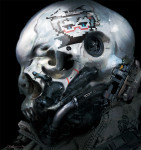
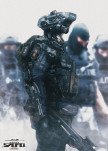
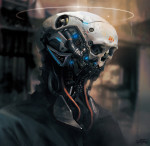

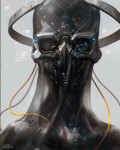
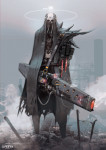
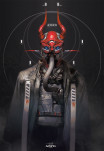
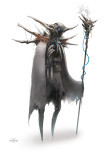

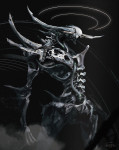
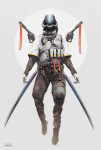
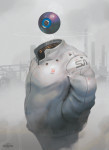
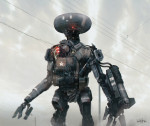
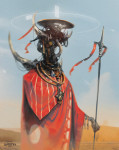





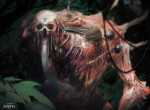
May 25, 2020
(Art) The Chthonic Curiosities of Mike Dubisch
[image error]
Freelance illustrator and comic artist Mike Dubisch summons the sheer swirling insanity of Lovecraft’s characters with his brush. His colorful, tumorous, tentacled creations stare at the viewer from bleak landscapes out of space and time.
Be sure to visit the artist’s webpage.
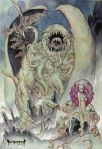
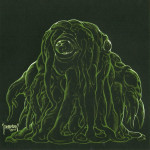
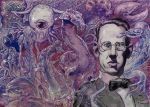
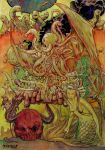
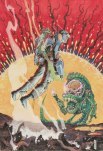



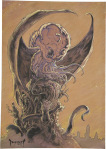
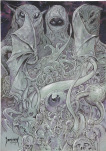

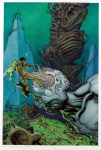
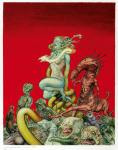
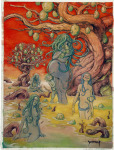
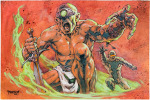

May 24, 2020
(Fiction) Bargains
The charges included assault of a minor (firing a gun at 17-year-old Guillermo Aquino); arson (of the house at 421 Asher St.); fraud (profiting under pretenses, namely, that Nio was a false expert); practicing medicine without a license; burglary (of the $800 Canine Companion, which the District Attorney claimed she stole for the purposes of committing arson); aiding and abetting (the operation of an illegal mod parlor); refusing to assist a police officer (by remaining as silent as a monk while the house burned); and fleeing a scene. Because of the number and severity of the charges, and because she had arrived on an out-of-state bus and either couldn’t or wouldn’t give a permanent address, she was held without bail. Because of her contact with the unknown organism, she was kept by herself in a holding cell, where she was arraigned, in lieu of potentially infecting everyone at the jail or courthouse. It was unnecessary, born of irrational fear, but Nio didn’t mind. It meant everyone came to her. It was then that all those involved in the case finally heard her speak for the first time:
“Not guilty.”
The judge explained that in the State of South Dakota, having a prior felony conviction meant that all of the charges against her were automatically raised in severity—a Class C felony became a Class B, a Class B became Class A, and so on. And since her prior had been a violent felony, sentencing was automatically pushed to the maximum.
“If convicted, I will have no choice in the matter,” the woman explained. “This is very serious. You are facing up to 80 years in prison. Do you understand that?” She asked it cautiously, like she wasn’t she if she needed to call in a psychiatric expert or try a different language.
“Yes.”
“Fine,” the judge said, gathering her papers. “You’ve been appointed a lawyer. I urge you to listen to him.”
The baggy, bespectacled man next to her stiffened slightly in pride.
“Is there some reason why I can’t have my medicine?” Nio asked. “I get headaches.”
The judge turned to the sheriff, who told her calmly but apologetically that he’d see to it. By his reaction, it seemed to be news to him. Even so, it wasn’t until the following day that he complied, and Nio spent the night with her head pounding in agony.
That morning, after a few hours sleep had abated the throb, the door to the booking room buzzed and the sheriff stepped into the long walkway that ran in front of the barred cells. He shut the heavy door behind him, making sure it was locked, and tossed an unopened box of aspirin through the bars. Nio was sitting cross-legged on the floor of her cell, meditating, and caught it one-handed. She looked at the red box quizzically.
“All I could get on short notice,” he said, leaning against the wall. “Your pills tested positive for opiates.”
“Are you amending my charge sheet?”
“That’s up to the district attorney.”
His nameplate said Marbrant. He had a thick gray mustache and two lifetime’s worth of wrinkles. He looked down the hall toward the fire exit.
“I used to think nothing much ever happened in this town,” he said. His voice echoed slightly off the painted block walls. “I liked that.”
Nio sat with socked feet under the beam of sunlight that fell in an angled shaft from the long window near the ceiling. The light bounced off the floor before scattering off the pale walls, illuminating everything brightly, like a photographer’s studio. She couldn’t get a good read on the sheriff’s bioelectrics. The metal bars interfered.
“First the deep core came. They promised jobs. Forgot to mention the earthquakes. Then, couple years ago, some of those dinosaurs moved through. You know about them? Smaller than I thought. I mean, don’t get me wrong. Some were bigger than a bull moose. But I thought dinosaurs’d be able to trample houses or something. Still, beautiful in their own way, with those colorful markings and everything. They passed a couple miles east of here on their way up to Canada. The whole town went out to see. Darndest thing.” He paused. “And now there’s you.”
Sheriff Marbrant took another long slow breath and rested his hand on his belt. “Unfortunately, it doesn’t look like anything significant will be recovered from the house. It took to that fire like a stripper to a pole, as my cousin likes to say. Still, the FBI’s supposed to be sending a man from Minneapolis, so you never know. Maybe they’ll dig something up.”
“Maybe.”
“You’re gonna have to watch out for Dr. Aquino, though. Guillermo’s mom. She’s real protective of that boy. And she knows Judge Bennam.”
“So I gathered.”
Nio had seen them talking at her arraignment.
“She seems to think you’re some kind of criminal mastermind who tried to murder her son. Raffela concurs. According to them, you provided the illegal data file to Guillermo—under false pretenses, of course.”
“Of course.”
“And when he told you what it was doing to Beckham, you came to cover your tracks and frame him.”
“Clever.”
“Kinda hard to argue when you won’t give your version of events.” He watched her swallow several pills. “You want more water?” He nodded to the bottle in the corner.
“I’m fine.” She chewed the bitter aspirin like hard candy. “That suggests you don’t believe them, Sheriff.”
He harumphed in dry humor.
“What about the girl? She okay?”
“Beckham? Well, she’s got permanent tissue damage. Apparently she’s in a lot of pain. But she’s gonna recover. Be on meds her whole life, doc says. She’ll never mod herself again, that’s for sure. Or so she tells me. Truly’s gone missing. Looks like she took off before the house caught fire.”
“What about Del?”
“I’m afraid I’m not at liberty to say.”
Nio squinted. “What does that mean?”
He shrugged a little. Then he straightened his steel buckle absentmindedly and picked at something stuck to the top with his thumb.
“Something you wanna ask me, Sheriff?”
“I don’t suppose you know a woman named Maureen Arneson.” His eyes went to Nio as soon as he pronounced the name.
“Should I?”
He shook his head. “Probably nothing.” He looked down again. “You sure you won’t give a statement?”
“Theoretically, Sheriff, such a statement might amount to the admission of several crimes.”
“There’s always that.” He smiled weakly. “Deputy Grady seems to think you’re waiting for something. Help, maybe. That true?”
Nio hesitated. “I was. But it looks like that’s not coming.”
He nodded at her statements as if they were a sermon. He moved as if to leave, but stopped. “I wonder if you could answer me something.”
“If I can.”
“Say for argument’s sake that Raffela and Dr. Aquino are stretching the truth. Where would young Guillermo have gotten this ‘sequence file’ they keep talking about?”
“Lotsa bad people out there, Sheriff.”
“Sure, but what would be the point? I mean, why go to all the trouble?”
Nio traced the cracks in the high ceiling with her eyes as if reading a story they told. She opened her mouth but didn’t speak right away. It took her a moment.
“In ’94, a 17-year-old Boy Scout and future Marine raided junk yards in his native Michigan for trace amounts of radioactive material: americium from smoke detectors, thorium from camping lanterns, radium from clocks, tritium from gun sights. In a shed in the back of his house, he used a Bunsen burner and the lithium he’d collected from a thousand dollars worth of batteries to purify the thorium ash, which he added to a bored-out block of lead with the hope of eventually making a breeder reactor.”
The sheriff scowled.
“It’s a reactor that produces more fissile material than it uses, meaning it can be used to seed other reactors. The FBI found him before that, but he did make a functional neutron source, which is the first step.”
“Jesus.”
“We love it when the guy tinkering in his garage is Bill Gates or Carroll Shelby . . .” She turned her head. “Five years later, inspired by the event, a pair of University of Chicago graduate students produced a working ‘reactor in a shed,’ which was one of the items on the university’s annual scavenger hunt. They were later able to isolate trace amounts of plutonium.
“Within a decade, in 2008, at his home in Arkansas, 14-year-old Taylor Wilson built a fusor, a device that suspends a magnetic field between two cages to heat ions to fusion conditions.
“Pick any science and it’s the same story. In 2016, a university geneticist began producing and selling CRISPR-based home genetic modification kits over the internet. The idea was that since rich people would undoubtedly use it to make their kids smarter and prettier than the rest of us, we should have access, too. That’s how modding started—guys wanting to grow an eight-foot penis and shit like that.”
“You’re saying it’s just another way to commit murder.”
Nio stretched her legs and laid them straight. “Not necessarily. For some guys, there’s definitely a ‘hold my beer’ element to it. They just want to play around with something dangerous. We like to stereotype them as morons, but a lot of them are actually highly intelligent. I’m sure you’ve seen the videos online. Some of those stunts take a lot of planning and craftsmanship.”
“They could take those skills and get a job,” the sheriff suggested.
Nio smiled. “Spoken like a lawman.”
“Doesn’t mean it’s not true.”
She got up and sat on the bench affixed to the rear wall. She ran a hand over her scalp. “Tell me something, Sheriff. Those jobs the mining company promised. How many of the blue collar ones were permanent positions?”
He didn’t answer. He didn’t have to.
“Rig like that, most everything will be automated, so you’re talking seasonal overflow to augment a permanent skeleton crew of skilled engineers. Can’t get a job like that without a degree. Doesn’t matter how smart you are. If your resume doesn’t check the right boxes, no corporation’s gonna take the risk. Why would they when there’s twenty other safe and compliant applicants? So you go to school and learn the approved curriculum, which takes years and gets you tens of thousands of dollars in debt to a bank that doesn’t care one snit about you. Now you’re in—and you spend the next 40 years of your life working to make someone else rich, just so you can pay back the money they lent you in the first place. Any job that pays decent is gonna be somewhere expensive to live, so you’re either pissing away the rest in rent, or you’re spending half your life in the car. Society makes that the choice and then wonders why these guys don’t wanna play.”
“What about the radioactive kid? You said he was a Marine.”
“Enlisted after his mother committed suicide—I think. Without any credentials, what do you think they had him doing? You think a kid who built a nuclear reactor out of junk at 17 years old was appropriately challenged by swabbing the deck? I don’t remember the details, but I remember they discharged him on mental health grounds. No help, just ‘Good luck, kid.’” She waved. “That was his reward for playing by the rules. So of course he stopped playing. He was arrested trying to steal smoke detectors. Smoke detectors,” she repeated. “Not a bank. I remember his mugshot showed that he was covered in radioactive sores. He died in his 30s.
“There’s a million similar stories. It’s an unnamed epidemic. Imagine if he had had access to something other than a few grams of radioactive material. Imagine if some angry kid in LA, instead of shooting up his school, decided to release a genetically engineered pathogen or wipe out all of Orange County with a momentary singularity.”
The sheriff was quiet a moment. “Can’t say I’d mind all that much.”
Nio smiled.
Sheriff Marbrant grimaced and shifted his stance. “I hear they can steal people’s memories now. I can at least lock my damned car.”
“You can thank the police for that one. The media blew it up of course, but they only retrieved some very basic information: whether her eyes registered light or dark when she was beaten, whether she was wet or dry, that kind of thing. It had rained that night and they were trying to impeach the defendant’s story that when he left her, she was safe at home. But yeah . . . How long before courts subpoena our thoughts? Or media companies sue regular folks for having infringing fantasies involving copyrighted synthetic personalities? It’s all coming.”
The holding cells fell quiet. The sheriff reached to his back pocket and pulled out a folded letter. The envelope had been opened. He held it up. “This was in your personal possessions.”
He pulled the top open with his thumbs and looked into it like he expected to find something new. “We opened it the night you were arrested hoping to get a name or address.” He looked up. “You haven’t read it yet, have you?”
Nio shook her head.
“Do you want to?”
She didn’t answer, and after a few moments, the sheriff knocked on the door. It buzzed from the outside and he pulled it open.
“I’ll put it with the rest of your things. In the meantime . . .” He pulled a thin folded newspaper from his belt. “You may wanna read that.”
He tossed it between the bars and it slid across the floor. The door shut behind him with a click.
The following day, Nio was told she had a guest. She was led from her cell by the same woman who had arrested her the week before. Her name plate said GRADY. They didn’t speak. Nio expected to be taken to one of the interview rooms, as she had been each time previously, to meet with the DA or her less-than-competent court-appointed attorney. Part of her hoped Mutiny had come to South Dakota without calling ahead. But Nio wasn’t taken to the interview room. They stopped in the office. Her handcuffs were removed and she was left alone in the middle of the floor. She watched Deputy Grady step through the door and shut it behind her.
She looked around. “Is this a lynching?” she asked no one.
Tires crunched gravel. Nio turned to see a limousine roll to a stop in the parking lot. A rear door opened and a middle-aged male chimpanzee in a finely tailored suit and no shoes slid out of the back seat to the pavement. He wore cuff links, a paisley tie, and custom black-rimmed bifocals. He walked to the door on his knuckles but stood upright to open it. Nio guessed he was at most four feet tall. Once inside, he waited by a desk as his human bodyguards came in behind him and quickly checked the office. Satisfied, they stepped out, and Nio was alone with an ape.
“I’m told I look taller on TV,” he said. When he didn’t get a reaction, he held out his hand. “Dr. Hamilton Chang.”
Nio took it. “Ah, yeah. I kinda figured.”
His nails were trimmed and his grip polite. Nevertheless, there was something decidedly bestial in the grasp—the dark coarseness of his skin perhaps. His biolelectric field was strange, completely unlike anything she’d felt before. She heard no music.
Both Nio and Dr. Chang noticed each other’s feet. She was in her striped socks. His feet were bare. They flexed their toes in show.
“After careful study,” Dr. Chang explained in a calm, gravely voice, “I’ve found that any shoes large enough to fit me also make me look like a clown—more than usual anyway—and that it’s more comfortable for everyone involved if I dispense with that particular human convention and walk as nature shod me. Please.” He motioned to a chair like the police station were his personal office. Then he climbed up one himself, gripping it with his feet like a baby climbing a sofa.
Rather than sitting against the back, which would’ve forced his bare soles to face Nio, Dr. Chang settled on the edge and crossed his legs, picking a piece of lint from his cuff like a tick from fur.
“I console myself with the observation that, while human feet are certainly daintier and more attractive, they are only made for walking, whereas I have four hands. Alas, in compensation, Nature omitted an opposable thumb from every single one of them.”
“On TV, they always film you from the waist up.”
“Quite. It’s a perk of my position.” His glasses slipped and he pushed them back up his face. “You must be wondering why I am here.”
“Did Mutiny send you? Because if you’re here to lecture—”
“Not at all. I haven’t seen Ms. Ali in some time, but I enjoy following her exploits, as I do all of you. I will admit a certain paternal compulsion, but I was only an adviser on the project. I am at best an uncle. But speaking of the others, I wonder if you heard the news.”
“News?” Nio scowled.
Dr. Chang looked down. “I was afraid not. The sheriff was only recently made aware of your identity. Perhaps you would like to sit down.”
“I’m fine.”
Dr. Chang sighed. “My dear, Sol is dead.”
Nio’s mouth hung open. Tears gathered at the corner of her eyes, as if she has just swallowed a hot pepper. It felt like she had been punched in the gut.
“Wh-what? How?”
“He was giving a talk. He collapsed on the stage. Brain hemorrhage. The funeral was last week. When you didn’t show up, I began making inquiries. Hospitals first. Then law enforcement.”
Nio fell back against a desk. Her head was spinning.
“Sol’s dead?”
It couldn’t be.
Sol was bright and invincible.
Nio covered her mouth. Tears came in earnest then an she slid to the floor. Dr. Chang dropped from his chair and wandered around the dim office until he found her a box of tissues. She took it, and after letting her sob for a few moment, he placed a coarse hand on her shoulder awkwardly.
“When was the last time you saw him?”
Nio blew her nose and wiped it. “Ummm . . . Luke’s coming out party, I guess. Five years ago. You’re serious?” She looked in his eyes with a glimmer of hope. “He’s really dead?”
Dr. Chang nodded. “I’m afraid so.” He put a polite distance between them. “The FBI are humoring me, thanks to my position.”
“FBI?” Nio wiped her red and swollen eyes. “I thought you were the head of the National Science Foundation.”
“Alas, my term at NSF ended last year. I am now ‘special acting science adviser to the president’ or something like that. To be honest, I’m not sure. I’m still waiting on the business cards.”
“Sounds important.”
Dr. Chang reached into the breast pocket of his coat and removed a folded slip of paper. He opened it and tossed it on the floor between them. “How long have you been chasing him?”
Nio didn’t move. She didn’t need to. She could see it was a page from a sequence report, probably from the tissue removed from Beckham Carter.
“There have been others, I suppose?” Dr. Chang asked.
There was no point in denying it. If the media was correct, Dr. Hamilton Chang, known as “Chop-Chop Chang” before the space flight that changed him forever, was one of the smartest creatures in the world.
“Six,” she said softly. “That I know of. He never acts directly so it’s hard to say.”
“Yes, he appears to be recruiting.”
Dr. Chang nodded to the paper. Above the rows of G’s, C’s, A’s, and U’s, he had sketched an ancient Hebrew numerological wheel. Base sequences were circled and labeled with Hebrew letters, converted via the wheel into Pythagorean ratios, which were then matched to a letter of the Latin alphabet. There were gaps between, but the circled sections spelled a question:
D O Y O UL I K E H U R TI N G PE O P L E?
“He’s been using occult cyphers,” Nio said. “Hermetic alchemy, Hebrew gematria.”
“If you hadn’t burned the house down, the police might’ve been able to recover computer evidence linking him to that unfortunate girl. As it stands, it looks very much like you are at fault.”
“Yeah, well, I didn’t have a lot of choices.”
“What do you know about him?”
“He targets people involved in illicit activity.”
“Clever. His victims will be unlikely to go to the authorities.”
“Which is why no one’s looking for him. He’s used a few different monikers, but lately he’s been posting under the username ‘Mr. Misery.’ I’ve done algorithmic image searches and semantic text matching, but so far nothing. If he has any other footprint online, he’s found a way to keep it separate.”
“So you took a risk and went into the field.”
Nio snorted in derision at herself. “Seemed like a good idea at the time.” She wiped her nose again.
Dr. Chang walked with swinging arms to chalkboard that summarized all of the sheriff’s open activities. He stood before it and crossed his arms behind his back. Nio wondered what he was thinking.
“How did you find him?”
“By accident, I suppose.”
“You are being modest.” The chimp turned with his arms still crossed. “You have been offering your services online to people with peculiar problems.”
“You’ve been checking up on me.”
“You won’t find this fellow from inside a jail cell.”
“Dr. Chang, sir, you came a very long way.” She paused. “What happened to Sol?”
He inhaled deeply. “Sol didn’t just have a hemorrhage. He had some kind of . . . eruption. The autopsy found several infarcts clustered around his pineal gland. Seven, in fact.”
“Seven?”
“They ranged in size. And yet, all the clotting was postmortem.”
Nio thought for a moment. “An accident? He banged his head and it only caught up to him later?”
“Very good. That’s what the medical examiner suggested—while at the same time noting in her report the complete absence of bruising, either on his skin or the surface of his brain, which you would expect if his head had been rattled so badly that he tore his cranial blood vessels in seven places. In fact, there were no marks on his body of any kind. No signs of trauma. No puncture wounds. His blood and tissues were free of all known toxins. There were no drugs in his system and only a trace amount of alcohol. He didn’t even touch the wine he was given at dinner. And in the hours leading up to his death, he was surrounded by others who reported him to be in good spirits. He was met at the train station by several academics from Columbia, where he participated in an afternoon symposium before joining them at a local restaurant. He was giving a public lecture that evening before a hundred people when he began speaking gibberish and collapsed. He was dead before the ambulance arrived. Several of the guests recorded the talk on their devices.”
“So there’s footage.”
“There is.”
“And?”
“That’s it.” Dr. Chang waited for her reaction.
“His brain just burst?” Nio stood and threw a wad of used tissues in the trash.
Chang could see the skeptical look on her face. “This morning, at my request, the FBI filed a writ with the Fifth Judicial District of South Dakota requesting that you be remanded into their custody. The court is not obliged to grant the request, but I see no reason why they wouldn’t, if only to make you the federal government’s problem. You’ll still be facing charges, of course, some of them quite serious, but I suspect that with the full weight of the Justice Department on your side, you’ll be able to negotiate a generous plea—perhaps even avoid further jail time. But I have no authority to guarantee that, of course. If you accept, you’ll have a mountain of paperwork to complete, and you’ll be fitted with an ankle bracelet. Your movements will be both limited and monitored constantly by the Bureau. But you’ll be out of that cage and helping to right a very serious wrong.”
“Wrong?”
Dr. Chang walked to her on swaying knuckles. “I will be frank. I suspect we’d both prefer it.” He stood straight. “I believe your brother was murdered.”
“Murdered?” She studied the floor as if it held all the answers. “Who would want to kill Sol?”
“I don’t know. Nor do I know how it was done. But last summer, Sol and I were at a conference in Bern and he confided in me that he was working on something extraordinary. It was so revolutionary, he said, that he felt the need to keep it completely to himself. He wouldn’t tell me. Nor did he speak of it to anyone else there.”
“That doesn’t sound like Sol. He was one of the most open people I’ve ever known.” Nio paused. “He got his heart broken a lot.”
“And there lies the answer to your question.”
“Ah.” Nio walked to the window. Outside, Dr. Chang’s suited bodyguards were keeping a close vigil on the front door. Secret Service. There was a tear clinging desperately to the lashes at the corner of her eye. She wiped it. “You think he told one of the others?”
“Wouldn’t you, if you were him?”
Mutiny had been Nio’s first call, however indirectly.
“I’m not exactly everyone’s favorite, you know. Not after—” She stopped.
“But if any of them are carrying his secret, they will be far more likely to share it with family. The FBI has made it clear they’re not interested in pursuing the matter. They agreed at the outset that the circumstances were odd, but after conducting a preliminary investigation, have found no evidence of foul play.”
“So you’re providing a free resource.”
“They’re humoring me because I am a very public figure and because I have the ear of the president. But their patience is not infinite. You would have to work quickly if you hope to benefit from their aid.”
“How do I solve a murder that’s not a murder?”
“Start with the others. See if you can ascertain what he was working on. That’s all I ask.”
Nio sat on the sill near the radiator. “Okay. But there’s still the obvious question.”
“Ah. Of course.” Dr. Chang nodded. “What’s in it for me?”
“And?”
“It’s a fair question, albeit one I’m not inclined to answer at the present time.” Dr. Chang held out his course-skinned hand. “Do we have a deal?”
rough cut of chapter four of my novel-in-progress, first in a series of sci-fi mysteries I’ve been calling Science Crimes Division
May 22, 2020
(Art) The Night Sprites of Tom Roberts
[image error]
The creatures and sprites of Tom Roberts, which have adorned posters and book covers, are opulent with detailed linework. One expects he could create the most fantastical tarot.
Be sure to visit the artist’s online shop.

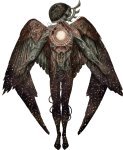



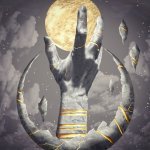





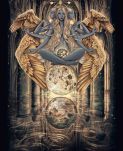
May 21, 2020
May 19, 2020
(Fiction) Ruptures
Nio awoke in a box amid a tangle of limbs. Wide-eyed, she screamed and kicked and pushed them away—only to feel silk-smooth synthetic skin. A hairless sex doll stared serenely in the dark, inches from her face, seemingly resigned to whatever fate befell them. For a moment, Nio was mesmerized. The doll didn’t seem fake. Her skin wasn’t a simple slab of silicone. It had tiny pores and very faint hairs. It wrinkled slightly at her slender knuckles. Her gold and lavender eyes glistened as if moist and were speckled in beautiful imperfections. The dimples around her areola were varied and asymmetrical. She looked organic, alive even. But she didn’t look real. Her eyes were enormous, her nose little more than a pert knob on her face. Her full, supple lips smoldered in permanent pink. She didn’t seem real because she was hyper-real, her features unnaturally exaggerated to complete her inhuman allure. She was as perfect as a goddess, and rentable by the hour.
“I don’t suppose you can get me out of here.”
As her panic subsided, the pain returned. Nio grimaced and shut her eyes. Her head throbbed from the blow. She needed her pills. Ostensibly, they were still in her jacket, which was wrapped warmly around her. But amid the weave of limbs, some of which had been detached from their bodies, she couldn’t move, as if they had intentionally been packed tight around her. She struggled to slide her right arm up, but her elbow kept getting caught in the crook of an inhumanly perfect knee.
The heavy box shook then as if being loaded into a vehicle. When it kept shaking, Nio realized it wasn’t a vehicle. It was a conveyor. When it stopped, she heard a muffled roar. She felt the heat almost immediately.
She was being incinerated.
So realistic was the doll that Nio glanced to her instinctively as if to gauge her reaction to their shared predicament.
“You’re no help,” she said, struggling.
The smell of smoke hit her nostrils and she shut her eyes to keep from panicking completely. She pulled and pushed and kicked.
“Fuck!” she screamed, over and over, as if it were a magic chant to free her. “Fuck, fuck, fuck!”
She kicked and kicked and felt a searing heat around her socked toes. She pulled them up as much as the synthetic goddess allowed. The smoke gathered in swirls until she could barely breathe. When she couldn’t hold her breath anymore, she inhaled and coughed uncontrollably. Some part of her hoped she would suffocate before being burned alive.
The heat intensified and her scalp tingled. A glob of molten plastic fell across the face of her companion and melted away the goddess’s nose. She was hollow inside.
The box shook hard and Nio turned and fell with the limbs and bodies across the cool floor. She coughed and coughed, trying to catch her breath while at the same time get to her feet. Someone grabbed her and she struggled.
She saw Dalrymple flat on the warehouse floor.
“It’s okay!” Del said. “It’s okay. I got you.”
He let her go and she slipped to the ground again. They were in a small workshop lined in sheet metal. The ceramic-lined incinerator stood above the floor on six legs, like a steel insect. The side release was open and flames spewed like jet exhaust. Del stepped over to turn a lever and the door slid shut.
“You are officially trouble,” he said.
Nio was on her back coughing and panting for air. “Are—” She coughed. “Are you following me?”
“Yes,” he said, “and you can thank me later.”
She looked to the big man on the floor, half expecting his arm to shoot forward and grab her throat. She coughed again. “How’d you get the drop on him?”
“I got lucky.”
He grabbed her jacket. Before she could object to his explanation, he pulled her to her feet.
“No.” She pulled away and almost fell again. “They’re gonna kill her.”
“Who?”
“The alabaster girl. Becky-Beck-something. They’re gonna kill her and tell everyone she went back to Florida. We gotta call the police. We gotta—”
“Okay, but we gotta get outta here first.”
Nio was swaying on her feet, and Del reached for her again.
“Where’s your phone?” she asked. “We gotta call 911.”
“We can’t.”
“Are you even listening—”
Del covered her mouth and shot a glance back toward the open garage door. “Would you be quiet! The city cops all work for Raffe. Or may as well anyway. Folks around here know that if you get in trouble, you call the sheriff.”
He removed his hand.
“How long will it take him to get here?”
“Depends on where his people are. It’s a big county.”
“I thought you said we were five minutes from everywhere.”
“In town,” he said, dragging her out of the shop. “My truck’s parked around the block.”
“That old thing?” She pulled out of her jacket and trotted shakily, arms out for balance, back to the unconscious Dalrymple.
“What the hell is wrong with you?” Del demanded in a stout whisper. “Are you trying to get us killed?”
Nio kicked him. When he didn’t move, she reached into his jacket and found the fob to Maybach. She pressed the button and heard a car beep and start its nearly silent engine.
“Let’s go.”
Del threw her coat at her and followed her into the back of the luxury car.
“You sure it’s gonna listen to you?”
“Why not? I have the fob.”
“And where are we going?”
“Take us to the ranch,” she told the vehicle.
“Understood,” it said pleasantly. “Departing for the ranch.”
The car’s blinker flashed as it pulled to a stop at the street. Sensing the way was clear, it turned and accelerated evenly.
“Make it fast.”
“I’m sorry,” the vehicle said. “I am not able to exceed the speed limit.”
“This is an emergency.”
“Please speak or type your emergency code.”
“Screw this. I’m taking over.” Nio crawled over Del—who pushed her wet sock out of his face—and slid into the driver’s seat. She started jabbing the touchscreen in the center console with her finger.
“Do you even know what you’re doing?”
“Believe it or not, this is not the first time I’ve done something like this.”
“Oh, I believe it.”
The map to the destination remained on the center screen, and Nio followed it as Del called the sheriff’s office and told them the short version of what happened. As they left the lights of the town and disappeared into the dark of the country, Nio’s heart rate slowed. She could feel Del’s bioelectrics again. They had barely changed.
“What about you?” she asked as she accelerated out of a turn. The car made almost no sound.
“What about me?” he said leaning forward from the back.
“You don’t seem that nervous for someone who just attacked a guy.”
“Would you rather I freak out?”
“Not really.”
“It’s not gonna take them long to realize something’s wrong. A car this expensive will have GPS tracking and anti-theft. Even if they don’t disable it remotely, they’ll know exactly where we are.”
“Then we need to go faster.”
Nio hit the gas and the luxury car accelerated so quickly that Del was knocked back. The wheels slipped twice on the ice and the car announced it was engaging four-wheel drive.
Eight minutes north of town, it pulled to a stop in the roundabout in front of a two-story coral-colored house with a white false colonnade. To the west was a four-stall garage, closed. Two cars and a Jeep were parked at an angle in the snow-covered clearing to one side.
A man opened the front door and shivered as he waited for whoever was in the car to exit. When nothing happened, he stepped forward and opened the passenger’s side door.
There was no one inside.
He heard feet on gravel and turned just in time to get whacked across the temple by a tire iron. Del patted him down and took his gun and his keys. Then he heaved the body into the back seat of the car, where it was out of sight.
He opened the trunk and Nio got out.
“That was a good idea,” he said.
Nio scowled. “It was yours.”
“Probably why it worked.”
She looked at the line of tracks across the wide snow-covered lawn. “How did you get here so fast?”
“I keep in shape.”
“That’s 400 meters through heavy snow.”
“They’re gonna be right behind us. Why are we arguing about how fast I can run?”
She thought for a moment. “Because it’s freaky.”
The front door of the house was still open and several Pomeranians appeared. One of them barked. Del and Nio darted to either side of the open door. He peered inside. There was no one. Judging from the panel in the wall, the house had a fancy security system, but it wasn’t engaged.
Nio saw the gun in Del’s hand. “Where did you get that?”
He motioned back. “Dude had it in his jacket.”
“You’re holding it properly.”
Del had one finger forward, ready to release the safety.
“Shooting’s kind of a thing out here.”
“Who are you?”
“I could ask you the same thing, Trouble, but we don’t have time. You wanna find the girl or not?”
Nio walked in cautiously. Other than the dogs, which growled at her, she didn’t hear anything. She shut her eyes.
“Lab’s downstairs.”
“How do you know?” Del whispered as he quietly shut the front.
“I just do.”
She could feel a strong magnetic field emanating from below them. They walked under a chandelier that hung from the second-story ceiling of the open foyer. The interior of the house was a nightmare in pastel. Everything was a similar shade of coral or taupe. A wide carpeted stairway rose to a sitting area under a dome skylight. Beneath the balustrade was a hall to a long living area. Nio could see a massive TV surrounded by custom shelves. Floor-to-ceiling windows at the back revealed the house had a pool, whose side-lit winter cover was topped in snow. Plugged into the wall near Nio’s socked feet was a small orange-and-white Canine Companion—a doggie love doll, a four-legged plastic receptacle designed to appease dogs with a humping problem. A sticker on the side said CLEANSAFE RESERVOIR. Across from it was an open doorway. Polished hardwood steps took a hard left and descended to a well-lit finished basement. At the bottom, in a custom-built nook, were a pair of large matching gun safes, both locked.
“Like an altar,” Del whispered.
The dogs barked again and wagged their tails from the top of the hardwood steps. But they didn’t move, as if they knew they weren’t allowed on the lower floor.
The basement was plushly carpeted and well lit. Around a bend was a long hall whose left wall was half glass. Beyond was a well-stocked maker lab. A blinking slab of angled plastic, a refraction panel, stood like a skinny white monolith near the all-glass door, scattering EM signals and making it hard for anyone outside to eavesdrop. Its presence suggested whatever they were doing there was worth a lot of time and money to conceal. It also gave Nio an immediate headache, despite that she had swallowed three pills in the car.
She grimaced.
“You okay?”
She nodded.
“You sure?”
At the back of the lab, rows of IV stands dangled plastic bags linked to each other by looped tubing. Bubbles flowed between. They were brewing something. Three makers were set against the left wall, including an old glass-walled 3D printer, about the size of a commercial oven, that had been stripped for parts. It looked like an empty arcade claw game. On the right was a brand new sequencer. Three block canisters rotated on a central pedestal with control console. The box and sheet plastic the device had come in were crumpled in the corner.
In the middle of the room was a large reclining dentist’s chair. Beckham lay on it, naked and curled in a fetal position. Nio could see her blistered back. The cysts looked different. They were dark inside, like a cluster of insect eyes. Next to her, Guillermo sat motionless on a rolling stool.
Del pressed a button on the wall and the glass door slid open. Nio’s headache immediately worsened, and she grimaced again. She was breathing hard and sweating. She felt like she might vomit.
Guillermo turned. He didn’t seem at all surprised to see them. His face was blank, his eyes dull. He’d taken something.
“Anyone here besides the guard?” Del asked.
“Celine,” he answered softly.
“Dancer?”
He nodded. “She’s upstairs.”
“Any other way out of the basement?”
Guillermo shook his head.
Del lowered the gun and nodded to Nio, indicating she could go ahead and he would cover their exit.
“She was so pretty,” Guillermo said, staring.
“Was?” Nio stepped to the girl and felt her neck. She had a pulse. But it was weak.
Guillermo didn’t move. “Raffe wanted me to give her a third breast. Can you believe it? A real one. She thought we would get a lot of publicity. Beckham didn’t want a third breast. She didn’t want to be a freak. She wanted to be an angel. No one had done wings before. With feathers. I was sure there had to be a way. I asked around online. They would just be ornamental. She knew that. But they would be real. She was so excited. She wanted to be like a Victoria’s Secret model. We knew if we were the first to do it, we’d still get a lot of publicity and Raffe wouldn’t be mad. Becks was so beautiful. I—I just . . .”
“You wanted her to like you,” Del said from the door.
Guillermo nodded and looked down at his hands. He was holding a needle. It was empty.
“What did you do?” Nio asked, grabbing it.
He started crying softly.
“What did you do?” she demanded.
“Raffe made me give her an OD,” he sobbed. “That’s what she meant. Take care of her.”
The tiny madame would have Guillermo then. She could hold that over his head forever.
Nio kicked the kid’s stool and he rolled to the corner. She stomped on the needle and started searching a wheeled glass-and-steel medicine cabinet.
“What are you doing?” Del asked. “We need to go.”
“She’s not gonna make it a mile! We need an opioid antagonist.”
“Shit,” he cursed. “I’m gonna go check the foyer.”
With two hands on the gun, Del moved cautiously around the corner.
“Ha!” Nio lifted the bottle with the clear liquid. She rifled through the drawers and cabinets until she found a needle. She measured a large dose and injected the girl in her arm. She followed that with a spinothalamic blocker. Guillermo didn’t move. His shoulders were slumped. He was crying.
“Beckham? Can you hear me?”
Nothing.
“Beckham?”
Guillermo stood suddenly. “What is that?” he asked, pointing.
Nio walked around the chair. The cluster of cysts on the girl’s back were moving. Something twitched inside each, like hatching eggs. Whatever they were, they wanted out.
Beckham’s marble body started shaking, rocking the chair.
“She’s having a seizure.”
Nio stepped to the medicine cabinet again and the girl went stiff as a board. She had extended everything—arms, legs, fingers. Her skin cracked and bled at several of her joints.
As if sensing she was in distress, the cysts on her back ruptured in every direction, spewing a long stream of clear mucus.
“SHIT!”
Del came running. “What the fuck is that?”
Strands of clear mucus spread like a web from the girl’s back to various points of increased temperature around the room. One sagging strand stretched from a baseball-sized blister to the back of a nearby computer screen, near the vent. Another stretched toward the door, but it was too far away and the strand had fallen to the floor. A third attached itself to Guillermo’s chest. The kid was frozen. He stared down at it, wide-eyed, as a black, translucent jellylike mass wriggled out the end and started crawling over him, like a hairy amoeba. He screamed and swatted it off and jumped back into the corner making noises.
Nio looked around the room. All of the mucus strands were slowly sagging as similar amoeba, each about the size of the cyst it had emerged from, began crawling over the walls, looking for an exit. The largest, the one that erupted from the middle, squeezed through a heating vent in the ceiling, near the back of the house.
Nio watched it disappear through the slats of the grate. “Shit!”
“What do we do?” Del was flustered.
“I can hear them . . .” Beckham breathed.
“She’s still alive.”
Del ran forward but stopped a few steps away. The empty red circles in the girl’s back were dripping pus.
Nio swiped the gun out of his hand. “Get the sheet plastic out of the box.” She pointed to the corner. “Wrap her up.”
“I can hear them . . .” the girl repeated.
“Hear them?” Nio asked. “Hear who?”
“Like . . . chanting . . .”
Del pulled the sheet free of the cardboard and draped it like a blanket over the naked girl.
“Take the car. Get her to a hospital.” Nio glanced to Guillermo. “Not the one in town. Somewhere else.”
“What about me?” Guillermo asked. His shaking hands were stretched out like he was afraid to touch himself.
“Strip,” Nio said.
“What?”
She shot the wall behind him and he began to strip as ordered.
“What are you gonna do?” Del asked, heaving the girl up from the chair.
Nio looked up. “I gotta make sure whatever got out of her doesn’t get away.”
“What the hell are those things?”
“I don’t know. Just go.”
Guillermo stood with his arms crossed in front of his boxers. He flipped his hair out of his face.
“You too,” she told him.
“What . . . like, outside? There’s snow.”
She walked over with the gun raised. He cowered as she pushed the barrel against his forehead. “A minute ago, you were willing to let that girl die. You’re lucky I don’t shoot you, you little brat. Now, GO.”
With hands raised defensively, the kid scampered out and up the carpeted stairs.
Del followed with some difficulty. “She’s heaver than she looks,” he said when he saw Nio’s face.
The dogs were waiting at the top. Nio shooed them out the front, where Guillermo shivered in his boxers.
“Cavalry,” Nio said. “And not the good kind.”
Car lights were approaching. Fast.
“Where are you going?”
Del was walking through the snow toward the garage. “They can disable that thing, remember? Dude had keys in his pocket.”
“Fuck.” Nio glanced to the approaching lights before running in her socks through the snow.
“Left side.”
Nio opened the Maybach, where the guard was slumped unconscious. The keys jingled as she pulled them from his pocket. They had the Jeep logo on the flat. She opened the vehicle and helped Del lay Beckham in the back. The approaching vehicles crested a nearby rise. Their engines roared. Two SUVs.
“Get her out of here!” Nio yelled, running back into the house.
“What are you gonna do? They’re gonna be here in a minute!”
“Just go!”
She ran through the living room and around to the kitchen and opened the cupboards until she found a bottle of vegetable oil. She trotted to the stairs and tossed some down the wall, at the very center of the house, and poured a trail across the hardwood to the hall, where she set the bottle on the floor. She yanked the Canine Companion from the wall and smashed it. Inside, the electrical cord was attached to a long heating prong. Dogs liked a warm companion, it seemed, just like people. She plugged the cord into a socket and inverted the prong into the half-empty bottle of oil. Then she ran upstairs.
The dancer, Celine, was in a bathroom. She had lit candles and placed them around the tub. She had music buds in her ear and was signing country music while smoking a joint. Nio pushed in and shot the ceiling. The girl yelped in the water and splashed. She pulled the buds from her ears and curled her arms in front of her naked body.
“Who are you?”
Nio saw the lighter next to the candles on the tub and grabbed it. “You need to get out of here.”
“I live here. Who the hell are—”
Nio shot the wall behind the tub three times. Bits of tile flew as the young woman screamed repeatedly and ran from the bathroom, slipping once on the tile. She stopped once and reached for the robe on the bed and Nio shot the bedroom wall. She heard the woman screaming all the way down the stairs to the front. She grabbed the bottle of hair spray next to the sink and stuffed it in her pocket. She heard car doors shut. The SUVs had already stopped in the roundabout.
“Shit.” Nio ran to the stairs.
“—but she’s still inside,” she heard Guillermo say.
“Go after them,” ordered another voice.
Dalrymple.
Nio backed down the hall as the second car left to chase Del in the Jeep. She heard heavy footsteps enter the foyer. At least three. She ran to a bedroom and looked around. By the kid-sized clothes in the walk-in closet, it was Raffe’s. True to form, she had an antique full-length mirror. Nio rifled through the drawers for a pistol, but Dalrymple came up the stairs and she had to duck into the opulent private bath, which had a second exit on the far side. She tiptoed to the door in her socks and quietly, slowly unlocked it, but there was a noise and she dropped with her back against the fancy tiled wall, listening to Dalrymple search the two bedrooms closest to the stairs. They couldn’t know where she was. If they were smart, the other two men would be guarding the front and back doors. If she was in the basement, then she was trapped and they would find her eventually, leaving Dalrymple free to start at the top.
He turned down the hall and froze when he saw her reflected in the mirror in the bedroom. She heard him stop, noticed the reflection, and jumped up as if to escape. Dalrymple extended his artificial arm like a battering ram and punched through the drywall. He would’ve snagged Nio easily—if she hadn’t disguised her location with a second mirror. Whether from haste or stupidity, the big man hadn’t noticed that she was facing the wrong way in reflection. His mechanical arm punched through the wall and grabbed air. Nio looped the hair dryer cord around it and turned it on, completing the circuit. Every light in the house flickered as Dalrymple screamed and went down.
The breaker flipped, the current stopped, and the lights resumed. Nio heard movement and heavy breathing. The big man was still alive and struggling to his feet.
“Shit . . .”
But the scream was enough. It called the other two, who came running up the steps. Nio darted to the window over the jet-tub and dropped with socked feet into the snow on the back lawn. The vent in the basement had faced the rear of the house, and she immediately saw the trail near a snow-covered patio set. It undulated like no animal track she’d ever seen, turning end-over-end as it wobbled toward an adjacent field, just beyond a line of bare windbreaker trees.
Shouts.
Nio looked up. But instead of shooting at her from the window, the men inside had discovered that the house was on fire. Once the oil ignited, it spread across the hardwood and up the wall of the stairs. Soon the entire structure would be burning. With her pursuers momentarily distracted by their own safety, Nio risked breaking cover for the field. Her socks crunched through the piled snow of the ditch on the far side and she sunk to her knees. The trail passed through a row of leafless bushes to the open field beyond—a giant square bounded by straight lines of windbreaker trees on all four sides. In summer, the field would’ve been pitch black on a moonless night, but now it was covered in a foot of snow, which faintly reflected the light from the lamps around the house and along the street, giving everything a twilight glow. It was empty except for three piles of railroad ties, stacked in alternating layers, and an enormous grooved metal loop, like a discarded magnet from a supercollider—at least a hundred feet across and well rusted.
A siren.
“Way to go, Del.”
There was only one, and it was still quite distant—sound carried far in the still, cold air—but it would be there in a few minutes. The fire department would take longer.
The track in the snow arced right to the railroad ties. As Nio approached, shivering, she could see they were stacked irregularly, and although not rotted through, they were deeply weathered and fraying. That gave the creature plenty of places to hide.
Shivering and with toes so numb it was becoming painful to walk, Nio stepped cautiously toward the dark stacks of ties. Her breath seeped like smoke signals from her nose as she flicked the lighter and held it on. The odd track rolled into the space between the piles, where it turned quickly toward the stack on her right. Nio knelt slowly and extended the tiny flame. There was no telling how the organism might react to heat or light, and she had visions of it launching itself out of the pile and squeezing down her throat. It had no skeleton, which meant it could squeeze through nearly any gap—even, presumably, her nostrils.
But there was nothing, just a small pile of snow on the third tie from the top. In squeezing between the ties, it seemed, the organism had lost a bit of snow that had clung to it. Nio walked, flame in hand, around the stack, looking for signs of an exit. She saw the organism immediately, immobile in the snow. It was no longer dark and translucent. It was whitish and opaque at the edges. It was freezing.
Nio stood over it.
“Homeostasis for the win, bitch.”
She raised the can of hair spray and burned the amoeba-like creature in the snow. It popped and shrunk like plastic as it boiled. She waved the flame back and forth as it turned brown and briefly caught fire. The flame went out and there was nothing but a few thin tendrils of black.
Nio collapsed against the ties. Her socked feet were no longer numb. Now they were burning. Despite that she was hidden by the stack of ties, she had left an easy trail for anyone to follow. The odds that she could out-pace someone with proper footwear through deep snow was practically zero. She dropped to her butt and sat cross-legged with her frigid feet pressed between her thighs and the tail of her open jacket. She pulled the flaps around her. Raffe’s house, now a fireball, had been built on a small rise, almost certainly to give it a view of the plains out back. Through a gap in the bare trees, Nio could see the deep core miner in the distance, its massive column-legs aglow in spiraling light, like tornadoes of blue fireworks. It was distant but beautiful.
A few light flakes fell through the still air, and Nio held out her hand to catch one as a speckled trout landed in the snow with a plop. It twitched twice and lay gasping.
Nio looked around, but there was no one who could’ve thrown it. She looked up in time to see another fall from the night sky some ten yards away. A moment later, a third fell through the tree line and made a ruckus.
“It’s raining fish . . .”
She heard the crunch of snow and turned to see a woman in an octagonal hat some 20 yards away. Her uniform said Brown County Sheriff. She appeared to be Native. She had a hand on her belt and looked in silence at Nio’s shoeless, shivering feet. Behind them, a column of flickering smoke rose into the night sky.
rough cut of chapter three from the novel-in-progress I’ve been calling Science Crimes Division. Chapter one is here and chapter two is here.



